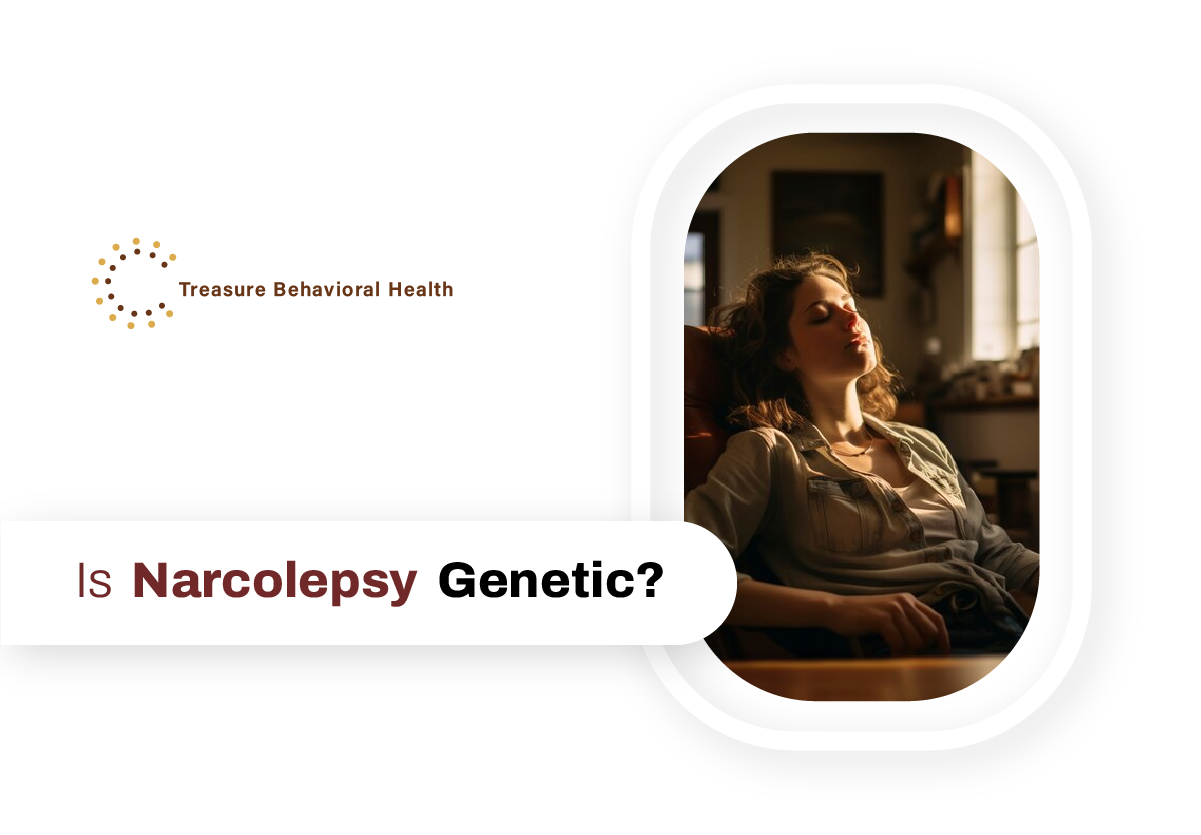Narcolepsy, often causing intense sleepiness and unexpected sleep bouts during the day, is a long-term sleep disorder. People might ask, is narcolepsy genetic?
Let’s look a bit deeper into this. We are looking into genetics’ influence on narcolepsy and how the environment plays a part.
What does this mean for those with a family history of the condition?
If you are suffering from a sleep disorder, you can go to Treasure Behavioral Health provides medication management and therapy sessions to manage your disorders. Look forward to assist you.
Understanding Narcolepsy
Narcolepsy is a brain disorder that messes up the sleeping awake cycles. People with this condition may wake up feeling refreshed but get drastically sleepy as the day progresses.
Some may deal with unexpected muscle weakness, known as cataplexy. Others might experience sleep paralysis and hallucinations.
Is Narcolepsy Inherited?
Narcolepsy studies show that it may come from DNA. When we look at families, those who are closely related to narcolepsy patients are 20 to 40 times more likely to get it themselves.
This hints that genes play a big key role Genetic Elements. One crucial genetic tag related to narcolepsy is the HLA-DQB1*06:02 gene.
This is part of a group known as the human leukocyte antigen (HLA) complex, which is very important for the immune system.
Around 90% of people with narcolepsy who also experience muscle weakness have this gene tag.
Environmental Factors
Even though genes are essential, narcolepsy can also be caused by things in the environment.
Stress, head trauma, infections, and alterations in sleep patterns can trigger the illness in people who are genetically predisposed toit.
Self-Defense Response
Narcolepsy could possibly be an autoimmune disease, according to certain evidence. It’s when the body’s defense system fights brain neurons, producing hypocretin, a crucial element for managing wakefulness. Environmental factors, such as infections, can potentially trigger this automatic response.
How to Diagnose and Treat
Narcolepsy is diagnosed by looking at a person’s medical history, their sleep logs, and special sleep tests like polysomnography and the multiple sleep latency test (MSLT).
To back up the diagnosis, genetic testing for the HLA-DQB1*06:02 gene may also be done.
Treatment of Narcolepsy
Narcolepsy cannot be cured, but there are many methods that can help people with it. Medications like sodium oxybate, selective serotonin reuptake inhibitors (SSRIs), and steroids are often given.
Making changes to your lifestyle, like taking naps on time, working out regularly, and eating well, can also make your quality of life better.
What Are Other Causes of Narcolepsy?
Narcolepsy is usually thought to be caused by a mix of genetic and environmental factors, but it can also be caused by other things, such as
- Brain tumors and strokes
- Infection
- Hormone changes
What Are Narcolepsy Symptoms?
- Excessive Daytime Sleepiness (EDS)
Feeling sleepy during the day (EDS) This is the top sign. EDS makes you want to nap all day, no matter how well you slept at night.
- Cataplexy
It means your muscles get weak all of a sudden when emotions like laughter or anger hit you hard. It can be mild, like eyelids sagging a little, or severe, like your whole body falling down. You stay aware, though.
- Sleep Paralysis
You can’t move or talk for a bit when falling asleep or waking up. This can last a few seconds or up to two minutes.
- Hallucinations
You might see really realistic and often imaginative sights when falling asleep or waking up. These are called hallucinations and can feel very real.
- Disrupted Nighttime Sleep
At night, people with EDS often wake up a lot. This could be due to vivid dreams, feeling frozen, or other sleep disturbances.
- Automatic Behaviors
Doing regular tasks without realizing or remembering is another sign. This can happen during short episodes of microsleep.
- Memory and Concentration Problems
Narcolepsy can mess with your brain functions. This can lead to trouble remembering things and concentrating.
Living with a Genetic Predisposition
When you have family ties to narcolepsy, genetic counseling can offer crucial guidance. It shines a light on the condition’s risks and what it means for the family.
Narcolepsy Awareness
This understanding of the genetic connection helps people make wise choices about family growth and how to handle the situation. It’s key to know about the genetic and environmental causes of narcolepsy. Education combats stereotype, promotes prompt diagnosis, and improves our overall approach to this condition.
Wrapping Up-Is Narcolepsy Genetic?
It’s a tricky health issue with genes playing a big part. However, it’s not all in the genes. The environment can trigger it too. If we get the details about these triggers, we can spot narcolepsy early. Better yet, we can manage it in a way that lets people live life to its fullest.
FAQs
Can narcolepsy be passed down to children?
Yes, it’s possible, as it can run in families. If your parents or siblings have narcolepsy, your chances of getting it are higher.
What are the primary symptoms of narcolepsy?
Feeling very sleepy during the day, cataplexy where your muscles suddenly get weak, being unable to move when waking or falling asleep, and seeing things that aren’t there.
Can lifestyle changes help manage narcolepsy?
Yes! Having naps at set times, working out regularly, and eating wholesome food can ease narcolepsy symptoms and boost your wellbeing.
Is there a cure for narcolepsy?
There’s no current cure for narcolepsy. But remember, through medical treatments and adjusting daily habits, you can manage symptoms and live a more normal life.


No comment